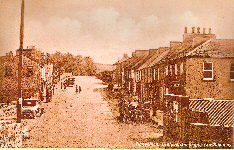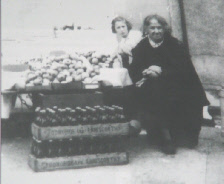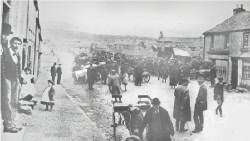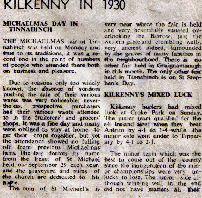Michaelmas Festival Tinnahinch © All rights reserved Privacy Policy | Terms of Use

Tinnahinch Michaelmas Festival to be revived this weekend
Published Date: 26 September 2008
THE traditional Michaelmas Festival in the village of Tinnahinch, Graignamanagh will be revived this weekend and locals believe this important cultural event is a real show of 'people power'.
In a bye-gone era, which will be replicated during the festival, the village of Tinnahinch was a hub of activity. Once a year when the festival came to town, rural and urban dwellers met and exchanged produce, services, cultural ideas and stories.

What a great day, nice to see such a buzz in the town, the festival was really well organised!
Paddy Walsh, Tinnahinch
Great Day
Emma Murphy, London.
Excerpt from article which appeared in The Carlow Nationalist re the launch of book ‘Tinnahinch, A village within a town’ by Owen Doyle & Colm Walsh
“This was the time when the people of the old hotel area were rehoused in the 44 cottages of a new housing estate off the St. Mullins Road. With 1939 as an anchor we moved back and forth, building up the history of the area and the families who lived there, based on the information to hand.”
Concerning the book title, Owen said Tinnahinch might be described as a village lost in a town rather than within it. “When away from home how many of us will claim to be natives of Tinnahinch? Rather we will say Graignamanagh. Our identity is linked to Graigue. The church and schools are there as is the post office which gives us Graignamanagh, Co. Kilkenny as our postal address.
“Of course, we have our own St. Michael’s cemetery, well and runs of St. Michael’s Church which go back in history much further than Graignamanagh.”
A few centuries ago, Tinnahinch had a fine castle. Later a hotel was built, being an important feature of the Barrow navigation passenger transport system and later still a stopping place for Bianconi’s coaches.
Because of the Tinnahinch people’s long association with and dependence on the River Barrow the book includes the stories of two boatmen, the late Jack Prendergast and Jim Gill, who was present at Friday’s launch.
Owen continued: “Looking at the old photographs and listening to the stories that people told me about former times in Tinnahinch I could only marvel at the lives of some of our ancestors. They were truly valiant men and women who deserve to have a place in history.
“Some travelled the world, fought in wars and returned to live very ordinary lives in Tinnahinch or Graigue. Some died on the battlefields. Others were involved in the War of Independence. Most were the daily hewers of wood and drawers of water – a necessity of the times before central heating and piped water became part of our lifestyle.
“All were affected by emigration to England, America or Australia. Sometimes even whole families left the village. Times were hard and poverty was rife. These families formed a close-knit community that survived poverty, unemployed and countless hard-ships.
“The death of a young woman who drowned escaping the police is recalled. So too, are the hardships of the boatmen on the river and the generosity of a woman who paid a fine to save two small children from being committed to a reformatory.
“In stories, songs and poems the loves of these people, whose greatness was never acknowledged because of the ordinariness of their lives, are remembered.
“It is in the ordinary that we find the extraordinary. Just to mention one or two of these people. Eddie Power, a man who died in his 40s, was a wonderful swimmer, diver, piper and poet who captured in verse the story of the people of Tinnahinch and the old hotel area.
“He had a wonderful gift of expressing the thoughts, emotions and aspirations of the people of the time.
“Then also, Kit Ennis, whose poems shows his great insight into life on the river.”
The book, said Owen, is an attempt to keep alive their memory and the memory of all those who lived in the old hotel area and Tinnahinch in the 1930s. “These are our ancestors, who struggled in the hard times, saw some of their children die from childhood diseases and others emigrate to foreign lands. But they survived unemployment and poverty. They also knew how to have fun.
“They enjoyed themselves at the regattas and fairs, playing hurling and football, went fishing and hunting, played cards and draughts, were up to all kinds of good natured pranks and above all, were good neighbours to one another.
Owen also made mention of local balladeer and poet Billy Hoare, who was present at the book launch, and whose poem ‘Tinnahinch’ brings many memories of people now gone.
The Deserted Village
By
Eddie Power
Sweet smiling village must we bid farewell
To that old homestead known as “The Hotel”,
Where goats and asses freely roamed at large
And grazed the dewy pastures free of charge.
The goats a meal of grass and ivy made,
To Daly’s turnips oft’ a visit paid,
They next to the “Twelve Acres” would repair
And Danny Carthy’ cornfield lay bare.
They oft’ disturbed Bob Baker’s sleep at night
But always vanished ere he bore a sight,
While Coady’s puckan issues forth a smell
That threatened to demolish “The Hotel”.
Farewell to meadow, avenue, wood, greenhill
Where asses, pigs and goats may ramble still.
The whitewashed walls, the skeoughs outside the door
To keep the goats off, “Devons” often swore
That if he could get poison from Kissane
He’d shorten for them life’s allotted span.
Their carcasses he’d leave upon the green
Examples for all others to be seen.
For asses ‘twas a regular dumping ground,
All sorts of breeds and sizes here were found.
Mike Doyle was sure to have a few,
Mick Grace and Fitz one each, Jack Conran too.
They often gave poor Daly’s oats a fright,
They stabled them in Boland’s bog at night.
If Boland came they threatened him with scorn
They’d want the asses handy for the morn.
The old ash tree, which weathered many a gale,
Could it but speak ‘twould record many a tale.
Twas here Lannan often eased his chest,
In argument he often swamped the rest.
The old ‘wood well’ may now choke up with weeds,
For many a year it satisfied all our needs.
‘The Devil’s Eyebrow’ and the old ‘dale’ trees
Where natives often sheltered in the breeze,
And those old haunts we now perforce must leave
And shift our fleabags up to Hughes’ field,
The one place outside Chinatown I know
With houses numbered backwards in a row.
Extracts from ‘Folklore Collection, Graignamanagh Boys School’
(Folklore Commission, UCD) – the stories below are taken from a collection of essays written by pupils of the Boys National School in Graignamanagh in the 1937. The students were instructed by their teacher to talk to older people in the community about life in the area and local traditions and to write an account of the stories they were told…
Michael O’ Shea, Chapel Street, Graignamanagh wrote the following about Michaelmas Day. He interviewed Mrs. Maguire, Tinnahinch who was 84 years at the time and was “reared and born in Tinnahinch” and recounted recollections from her youth.
“Jude and John lived in a small house which stood on the side of the National Bank. It was a custom then to have pasties for Michaelmas Day and Mrs. Maguire said that she often bought pasties from Jude and John. They used to make them with flour and barm with mutton chopped up and put in the centre of it….”
Does anyone know the full recipe for Michaelmas pasties?
Contd… “Michaelmas was a great day then. Preparations used to go on for a week before. The fair was held on the street and out the roads. A pilgrimage used to be done on that day also around Saint Michael’s old church and used to finish at Saint Michaels well where the pilgrims used to finish their rounds by taking a drink of water. It was customary for people meeting on that day to greet each other and say “My Michaelmas feirin on you”
When selling or buying pigs or sheep the buyer would want so much ‘boot’ that means the seller should give so much back to the buyer. There were two poor women who lived in Tinnahinch who used get a great deal of food on “score” that means without the money. This day one of them had a pigs head going home and the other woman said “is it a head you have today?” “Yes” said she “I might as well let the toll of the bell pay for all”. One day two women had a quarrel. They were giving ‘tongue’ to each other. A neighbour Ellen Ashe who was listening. At last she spoke and told the woman if she put the curse of Moses on her it would be better than if she kept cursing for the day. The woman answered “Let her have it”.”
The piece below was also written by Michael O’ Shea based on his conversations with the afore mentioned Mrs. Maguire. It is not a direct reference to the Michaelmas fair but rather bi-monthly fairs that were held in Tinnahinch. It gives us an insight into the distance people used to travel to come to the far and the way in which they transported their stock.
“Tinnahinch is situated on the Carlow side of the river Barrow. In years gone by there were two fairs held in Tinnahinch every month. One fair for the fat pigs and the other for sheep and cattle. A day or two before the fair pig-buyers used to come from Waterford to Graig . At that time there were no motors or lorries. The way they used to take them was by boats. The pigs were driven down the track and kept in a creeled space overnight. The turbine occupies this space now. On one occasion there did 2 boat loads of pigs sink in the tide.”
Another success festival for Graiguenamanagh
Tuesday September 29 2009 excerpt from the Carlow People
THOUSANDS OF people gathered in Tinnahinch throughout the weekend as Graiguenamanagh proudly hosted yet another highly successful festival.
Following on from the success of Feile Freaney and the Town of Books last week, the second annual Michaelmas Festival was a resounding success with up to 5,000 gathering in the town on Sunday alone to relive the joys of days gone by.
After a forty year absence, the Michaelmas Festival was relaunched last year to an excellent and enthusiastic public response.
Last weekend's event was even bigger and better with over 34 stands and numerous activities taking place that drew on the influences of the past and sought to recreate the heady atmosphere of those Michaelmas Festivals at the turn of the century.
Throughout the two day festival there were a craft and farmers markets featuring pottery, woodturning, crystals, clothes, exotic fine coffee, patchwork quilts, jewellery, paintings, food and drinks.
Saturday afternoon saw an under8's and under-10 hurling matches, a brass band parade, Irish dancing and kid's entertainment with a puppet show, magician and kids disco.
That night there was live music in O'Driscoll's Bar with Pat Byrne and Seamus O'Brien.
The following day, Sunday saw live demonstrations of Green Willow furniture making, thatching, felt making, weaving, butter making and woodturning.
All proceeds raised through last weekend's festival will go towards the purchase of Christmas lights for Tinnahinch and Graiguenamanagh.




Jim Whelan kindly sent us this newspaper cutting from 1930, it mentions that some vendors were absent from this particular fair, does anybody know why? Hurling semi-Final perhaps? Let us know if you do! Use the contact us form to send us an email